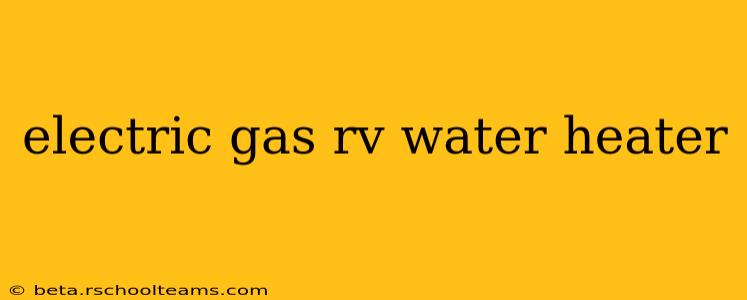Choosing the right water heater for your RV is crucial for comfortable camping. This guide explores the nuances of electric and gas RV water heaters, helping you decide which option best suits your needs and lifestyle. We'll delve into their functionalities, pros and cons, and address frequently asked questions to provide a comprehensive understanding of this essential RV component.
What is an Electric RV Water Heater?
Electric RV water heaters rely solely on electricity to heat water. They typically use 120-volt AC power, drawing from your campsite's hookup or a generator. These heaters often feature a tankless option, meaning they heat water on demand, eliminating the need for a storage tank and saving space. However, tanked electric water heaters are also available. The heating element within the tank heats the water, which is then stored until needed.
Pros:
- Quiet operation: Electric heaters are generally quieter than gas heaters.
- Clean energy: They produce no combustion byproducts, making them environmentally friendly.
- Easy installation (typically): Installation can often be relatively straightforward, depending on the model.
Cons:
- Dependence on electricity: They require a reliable power source, limiting their use in areas without hookups or when generators are unavailable.
- Slower heating: Tanked electric water heaters may take longer to heat water than gas counterparts.
- Potential for higher energy costs: Depending on your location and electricity rates, operating costs can be higher compared to gas.
What is a Gas RV Water Heater?
Gas RV water heaters utilize propane or LP gas as their fuel source. They're typically equipped with a burner that heats the water stored within a tank. These are extremely common in RVs due to their versatility.
Pros:
- Independence from electricity: They operate without needing an electrical hookup, offering greater flexibility while boondocking or dry camping.
- Faster heating: Gas heaters generally heat water faster than electric models.
- Lower operating costs (often): Propane is often cheaper than electricity, leading to lower operating costs in many areas.
Cons:
- Noisier operation: Gas heaters tend to be noisier due to the burner's operation.
- Requires ventilation: Proper ventilation is crucial to prevent carbon monoxide buildup, posing a safety hazard if not handled correctly.
- Potential for gas leaks: Regular inspection and maintenance are necessary to prevent leaks and ensure safe operation.
What are the Different Types of RV Water Heaters?
This question encompasses both electric and gas options, as mentioned above. Beyond the fuel source, you'll also encounter variations in tank size (capacity) and whether the unit is tanked or tankless. Tankless heaters provide instant hot water but require a higher energy demand. Tanked heaters store hot water, offering a supply ready for use, but consume energy to keep the water heated.
How Much Does an RV Water Heater Cost?
The cost of an RV water heater varies greatly depending on several factors: the fuel type (gas or electric), tank size (capacity), the brand, features (like tankless technology), and whether you're purchasing a replacement or a new unit for installation. You can expect to pay anywhere from a few hundred dollars to well over a thousand dollars.
How Long Does it Take to Heat Water in an RV Water Heater?
The heating time depends on the water heater type, size, and starting water temperature. Gas water heaters are typically faster, often heating a full tank in around 30-45 minutes, while electric water heaters may take longer, possibly 1-2 hours or more depending on the capacity and wattage.
How Do I Choose the Right RV Water Heater?
Selecting the right RV water heater involves carefully considering your camping style and needs. If you frequently boondock or camp off-grid, a gas water heater offers greater independence. If you primarily stay at campgrounds with hookups, an electric water heater might be sufficient. Consider the number of people in your group and your typical water usage to determine the appropriate tank size.
Electric vs. Gas RV Water Heater: Which is More Efficient?
The efficiency of an RV water heater depends on several factors and isn't easily generalized. Gas heaters generally have a higher BTU output, leading to faster heating, but their efficiency can be impacted by factors like proper ventilation. Electric heaters' efficiency depends entirely on the efficiency of your power source and usage patterns. The "more efficient" option ultimately depends on your usage patterns and local energy costs.
Maintaining Your RV Water Heater: A Crucial Aspect of Ownership
Regardless of whether you opt for gas or electric, regular maintenance is essential. This includes flushing the tank periodically to remove sediment buildup, checking for leaks, and ensuring proper ventilation (for gas heaters). Consult your owner's manual for specific maintenance instructions for your model. Neglecting maintenance can lead to reduced efficiency, premature failure, and potentially safety hazards. Proper maintenance will significantly extend the life of your water heater, ensuring comfortable hot showers on all your adventures!
